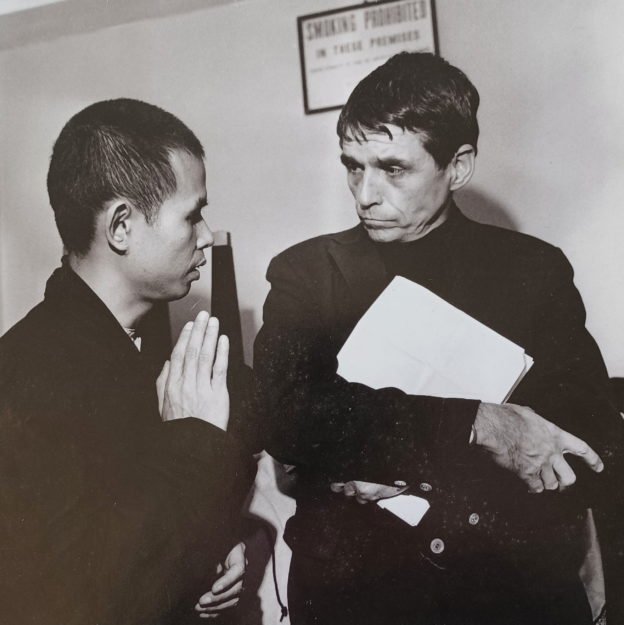By Sarita Tamayo-Moraga
Thich Nhat Hanh, the beloved Vietnamese Zen Master renowned for his accessible teaching on Zen and mindfulness as well as his activism and work in Engaged Buddhism, died on Jan. 22, 2022. He is so widely known among the contemplative community that I will not focus on his biography, but instead on how my students have internalized and been helped by Hanh’s teachings.
Among Thich Nhat Hanh’s many works included a co-authored book with Jesuit poet and peace leader Daniel Berrigan, S.J. (above), titled, The Raft is Not the Shore: Conversations Toward a Buddhist-Christian Awareness (Orbis, 1975/2001). Photo courtesy of Jonah House.
A prolific author, Hanh wrote a dizzying array of works, all focused on the same outcome: transforming suffering into peace, joy, and liberation. This process of transformation through spiritual practice (Zen and mindfulness) did not stop with individual transformation. Hanh emphasized over and over that internal transformation links to external transformation, even going so far as to linking personal spiritual practice to the ability to be compassionate leaders.
His book Calming the Fearful Mind: A Zen Response to Terrorism encapsulates the way transformation of suffering inside can lead to transformation of suffering outside.
For about 13 years, I have been assigning this text to students in my Religious Studies classes as a way to help them experience the contemplative piece of the Jesuit ethos of contemplatives in action. It’s also a way to demonstrate and try out the way action without contemplation/spiritual practice—especially action in a time of fear and anger, such as the one we are in now—can lead to more harm and more suffering.
In part a response to Sept. 11, the book also focuses on how patterns of consumption feed anger or fear or feed tranquility and calm. In particular, the chapter “Nourishing Peace” literally walks students through the consequences of their consumption of the Four Nutriments: Edible Food, Sensory Food, One’s Deepest Desire, and Consciousness. Despite all of the research on the harmful effects of junk food and harmful social media, the students are often still shocked when they cultivate awareness of whether or not what they consume nourishes peace or its opposite. However, although awareness is the first step to a process of transformation, awareness on its own does not transform suffering into peace, joy, and liberation.
This is where the text Zen Keys by Hanh comes in. The first chapter, “The Little Book,” emphasizes practice over theory and unpacks how and why knowing what we are doing when we are doing it is the foundation of the transformation of suffering. More than anything else over the years, the teachings in this chapter alone have proven helpful to my students. Zen, as a whole, relentlessly rejects metaphysics and employs many methods to help practitioners drop out of concepts into direct experience. This chapter condenses this process into the creation of “gathas, short verses that bring the energy of mindfulness to each act of daily life.” (Hanh, Zen Keys, p. 24).
Especially during the time of remote teaching, students movingly reported how working with a personalized gatha helped them cope first with the abrupt shift to online teaching and learning, an unexpected return home, and then with the grim realization that remote learning would last much longer in order to keep everyone safe.
Many students struggled with being back in their childhood bedroom, stuck once more in old dynamics. Others experienced unimaginable losses such as the death of multiple family members to COVID-19.
Working with their gathas helped them accept their new reality and work to see the positive—such as extended time with family members, eating home-cooked meals, the chance to live again with beloved pets. They self-reported unexpected contentment and described the ways in which their spiritual practice helped them deal with the challenges of a sudden return to home life as well as being cut off from all that they thought college would bring them communally.
Primarily, they had tools to transform their suffering and nourish peace in the midst of chaos, unpredictability, and exhaustion.
Sarita Tamayo-Moraga is a senior lecturer of Religious Studies at Santa Clara University.
The featured cover photo (above) is courtesy of Santa Clara University.


